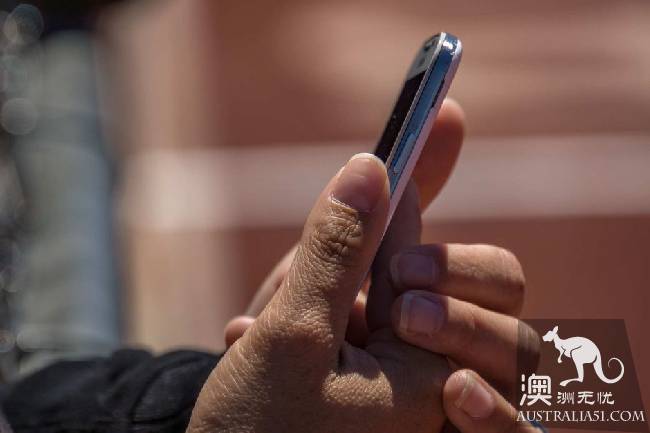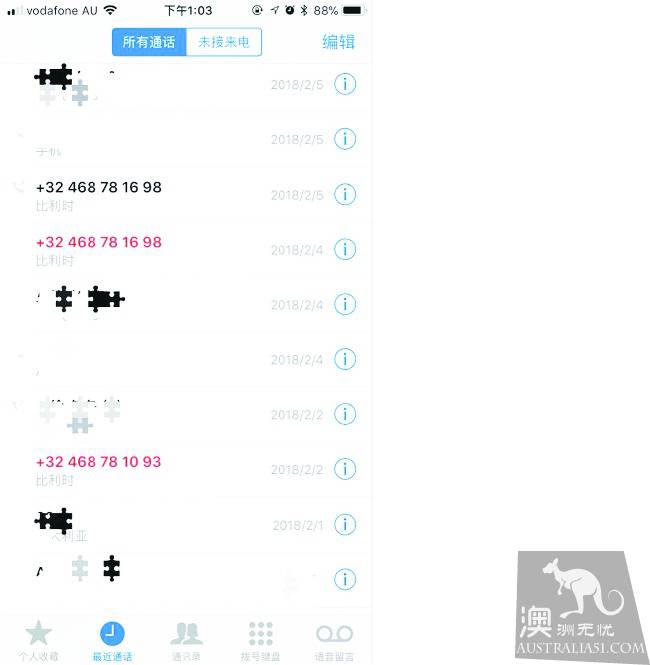
The Australian Competition and Consumer Council says it received more than 50,000 phone fraud complaints in 2017. (Australian Broadcasting Corporation Photo)
Compile / Xiao Chenlei
Many citizens have recently found cell phones showing missed calls from overseas or frequent phone calls impersonating (Centrelink) of the Australian Welfare Department and (ATO) of the Australian Inland Revenue Department. Australian police have warned that these are typical methods of telephone fraud in Australia in recent months, which has led to the loss of property by many Australians.
Telephone fraud accounts for 40% of fraud cases in Australia
According to the Australian Broadcasting Corporation, 40 percent of the fraud in Australia is carried out by telephone, in addition to 26.5 percent of mail fraud and 15 percent of SMS fraud. In other words, telephone fraud is currently the most common fraud in Australia. According to Ms. Rikard (Delia Rickard), (ACCC) vice-president of the Australian Competition and Consumer Council, phone calls are cheap, especially in countries where labour prices are low, allowing fraudsters to hire an entire telephone center for phone fraud. And the more personal phone calls or text messages, the more attractive victims are.
The fraudster may target anyone with a cell phone number, regardless of your background, age or income.
There are many types of telephone fraud. More recently, a form of phone fraud known as "Wangiri," the word "Wangiri", comes from Japanese, meaning that the phone rings and hangs up. (Consumer Watchdog), a consumer supervision organization, reminds the general public not to call back when they see strange calls from overseas, because once they reply to these calls, Fraudsters will begin to charge high charges for overseas telephone communications through Internet loopholes.
The Australian Competition and Consumer Council's fraud monitoring platform, Scamwatch, received 277 complaints of phone fraud last week, an increase of 794 percent over the previous period. Among these complaints, many swindlers falsely claim to have called from the Australian Welfare Department or the Inland Revenue Department. In August, there were complaints that swindlers were posing as employees of Australia's national broadband network (National Broadband Network) in an attempt to coax sensitive personal information about the victims.
Victims of "Wangiri" phone fraud
One of the latest victims of "Wangiri" phone fraud is reported to be a 10-year-old boy from Brisbane, Carrington (Leo Carrington). He was coming home from school to do his homework, but received several suspicious calls starting with 247. From the caller's ID on his phone, we can see that the source of the call is (Ascension Island)., Ascension Island, on the west coast of Africa. The boy said he didn't take these strange missed calls into his mind at first, but his cell phone kept getting calls that night, and by the time he woke up the next morning, he had received 15 missed calls from that number. Ever since that day, the boy has been receiving calls from the number.
The boy's parents found it strange to receive strange calls from overseas, and their son had only been using his new phone for a week. When the boy's father tried to call back the number, she heard the voice of a woman who could not speak English at all, and the woman certainly failed to answer any of the father's questions. The Carrington family said they had no idea how much money they would lose from the fraud.
A special interview with the newspaper also found that Ms. Li, who works in Sydney, also received two calls from Belgium earlier this month. Ms. Li said she did not answer the first call, but that she happened to pick up the phone quickly on the second call. Ms. Li said she hung up immediately after the call had been made without a word, and the phone from Belgium never called again. Li said, fortunately, she did not call back, otherwise her account is likely to be withheld international long-distance costs.

Ms. Li from the Chinese community in Sydney showed off her cell phone and received an overseas call showing that the source was Belgium.
How the fraudster gets the cell phone numbe
The Brisbane boy Leo, whose cell phone card has only been activated for a week, received a fraud call. In the case, Ms Rikard thinks Leo may have been the subject of random dialing by computer systems. Most of the victims of phone fraud are randomly filling in personal information online, registering apps or taking part in raffle and questionnaire surveys.
More and more people are being asked to do a variety of questionnaires online, Rikard said, and there are plenty of examples where users' personal information is consolidated and sold. "once you respond to a fraud call, the fraudster will sell your contact details to other potential fraudsters."
The Australian Competition and Consumer Council recommends that victims inform fraud surveillance site Scamwatch, about their experiences so that more people can avoid becoming victims of phone fraud. Rikard also suggested working with financial intermediaries to avoid property loss abroad.
Call back strange calls or pay high charges
Rikard, vice chairman of the Australian Competition and Consumer Council, said Scamwatch received similar fraud reports last year, but only three were linked to phone fraud from Ascension Island. The essence of phone fraud is to procrastinate as much time on the phone as possible, whether by playing music or by saying something that the listener doesn't understand. Swindlers deceive money by calling back expensive phone numbers similar to psychic or sexual service lines from temptation citizens. She said that while the toll system is complex, people tend to charge a lot more for talking to these suspicious unfamiliar numbers, and the fees go directly to the crooks' pockets.
Statistics show that Australians have lost a total of A $48830 over the past 12 months on such "expensive" hotlines or text messages. To avoid the extra cost of such phone fraud, Rikard warned you not to take strange calls from overseas, or call numbers starting with 19 or 1900 from Australia, because these are suspicious phone fraud numbers. In addition, blocking strange numbers with problems on mobile phones and not returning calls to unknown missed calls can also avoid being the victim of phone fraud.
If she accidentally becomes a victim of such phone fraud, Ms Rikard suggests contacting providers of communications services and explaining to them what happened, and in most cases providers of communications pay for the costs of phone fraud. There are also some communications providers who are prepared for phone fraud losses, so contact them to avoid having to bear the cost of the loss.
Racketeering call
Rikard suggested several ways to judge the other person as a fraudster, including:
- The other party claims to be from a computer software company and wants to get into your computer; * the overall quality of the call is poor;
- To enquire on behalf of government about the bill of payment in the form of consumer card and gift card, such as the iTunes gift card;
- Improperly exerting pressure on the other party to attempt to capture information, including threats or the addition of evil words;
- Any telephone number asking for bank card information;
(Telstra) also warned members of the public on its website not to take calls from the so-called Australian Federal Police Department, falsely saying they needed help in catching criminals. In these calls, swindlers often need the receiver to send money abroad through an international telegram remittance service.
What if you get a fraud call?
Once it is confirmed that a fraud call was received, Rikard suggests hanging up directly. In addition, the Australian Competition and Consumer Council has proposed the following responses:
- Do not answer or call back the system automatically generated numbers and strange suspicious numbers;
- Be vigilant and vigilant. If you are not sure if the person on the other side of the phone is the person they claim to be, hang up and call the official number of the agency concerned.
- Never make payments on an unknown call, leak personal information, or provide access to your own personal computer;
- Do not reply to unknown overseas numbers;
- Don't pay with a iTunes gift card. No regular business or company in Australia needs to pay a bill with a gift card.
- Delete any voice messages left in your message box;
- Report details and experiences of your phone fraud to someone or agency you trust.
In addition, the police suggest that if you receive a call like "can you hear me" at the beginning, please do not reply and must hang up immediately. As soon as such calls are answered, they are likely to be spoofed, and then check carefully to see if the bank card has been withheld.